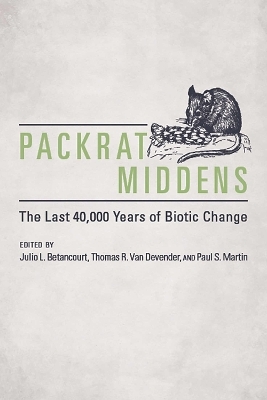
Packrat Middens
The Last 40,000 Years of Biotic Change
Seiten
2016
University of Arizona Press (Verlag)
978-0-8165-3284-1 (ISBN)
University of Arizona Press (Verlag)
978-0-8165-3284-1 (ISBN)
Over the past thirty years, late Quaternary environments in the arid interior of western North America have been revealed by a unique source of fossils: well-preserved fragments of plants and animals accumulated locally by packrats and quite often encased, amberlike, in large masses of crystallized urine. These packrat middens are ubiquitous in caves and rock crevices throughout the arid West, where they can lie preserved for tens of thousands of years. More than a thousand of these deposits have been dated and analyzed, and middens have supplanted pollen records as a touchstone for studying vegetation dynamics and climatic change in radiocarbon time (the last 40,000 years). Now, similar deposits made by other mammals like hyraxes are being reported from other parts of the world.
This book brings together the most recent findings and views of many of the researchers now investigating fossil middens in the United States, Mexico, Africa, the Middle East, and Australia. The contributions serve to open a forum for methodological concerns, update the fossil record of various geographic regions, introduce new applications, and display the vast potential for fossil midden analysis in arid regions worldwide. The findings presented here will serve to foster regional research and to promote general studies devoted to global climate change. Included in the text are more than two hundred charts, photographs, and maps.
This book brings together the most recent findings and views of many of the researchers now investigating fossil middens in the United States, Mexico, Africa, the Middle East, and Australia. The contributions serve to open a forum for methodological concerns, update the fossil record of various geographic regions, introduce new applications, and display the vast potential for fossil midden analysis in arid regions worldwide. The findings presented here will serve to foster regional research and to promote general studies devoted to global climate change. Included in the text are more than two hundred charts, photographs, and maps.
Julio L. Betancourt is a geoscientist with the National Research Program, Water Mission Area, US Geological Survey, and adjunct professor at the University of Arizona, USA. He is co-editor of Packrat Middens: The Last 40,000 Years of Biotic Change (1990), has published more than 150 journal articles, and co-founded both the Southern Arizona Buffelgrass Coordination Center and the USA National Phenology Network. Thomas R. Van Devender is the Senior Research Scientist at the Arizona-Sonora Desert Museum. Paul S. Martin is a professor emeritus of geosciences at the University of Arizona, USA.
| Erscheinungsdatum | 03.03.2016 |
|---|---|
| Verlagsort | Tucson |
| Sprache | englisch |
| Maße | 178 x 254 mm |
| Gewicht | 862 g |
| Themenwelt | Naturwissenschaften ► Biologie ► Botanik |
| Naturwissenschaften ► Biologie ► Zoologie | |
| ISBN-10 | 0-8165-3284-2 / 0816532842 |
| ISBN-13 | 978-0-8165-3284-1 / 9780816532841 |
| Zustand | Neuware |
| Haben Sie eine Frage zum Produkt? |
Mehr entdecken
aus dem Bereich
aus dem Bereich
Gefäßpflanzen: Grundband
Buch | Hardcover (2021)
Springer Spektrum (Verlag)
CHF 62,95
ein Baum erzählt seine erstaunliche Geschichte
Buch | Hardcover (2024)
Ludwig (Verlag)
CHF 32,15


